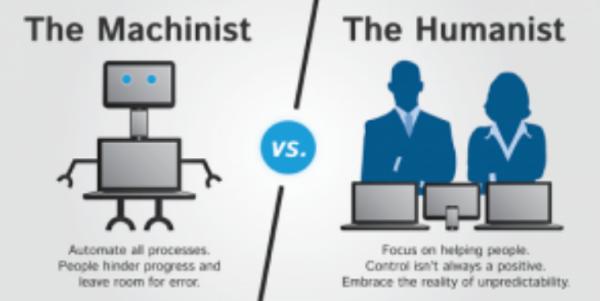Main points (and limits) of a new Digital Humanism Manifesto
“The system is failing” said the founder of the Web, Tim Berners-Lee…

The sentence above is the opening of a new Manifesto on Digital Humanism, published in Vienna in May 2019. Here are, in my opinion, its most important points (and, in some cases, weaknesses) that everybody should know. Bold sentences in parentheses are my own comments.
On technology changing the very definition of human
Digital technologies are disrupting societies and questioning our understanding of what it means to be human… The flood of data, algorithms, and computational power is disrupting the very fabric of society by changing human interactions, societal institutions, economies, and political structures…. We must shape technologies in accordance with human values and needs, instead of allowing technologies to shape humans. (same crucial point made by Eben Moglen here)
Getting priorities straight
Decisions with consequences that have the potential to affect individual or collective human rights must continue to be made by humans. Decision makers must be responsible and accountable for their decisions. Automated decision making systems should only support human decision making, not replace it. (YES!!!!!)
Technological innovation demands social innovation, and social innovation requires broad societal engagement. (WRONG! Replace with “REAL social innovation is badly needed these days, and it requires both broad societal engagement and technological innovation. In THAT order)
Regulators need to intervene with tech monopolies. (SURE! But not as Mrs Warren says, that is a dead end)
It is necessary to restore market competitiveness as tech monopolies concentrate market power and stifle innovation. (NO,thanks. What is necessary is to restore protection of human rights and equal opportunities from digital attacks. If, eventually, that also happen to benefit “the markets”, all the better of course.)
Technological disciplines such as computer science / informatics must collaborate with social sciences, humanities, and other sciences, breaking disciplinary silos. (Of course, you have to push most of the current Silicon Valley, and Venture Capitalists in general, out of the way to make that happen.)
Practitioners… need to understand that no technology is neutral and be sensitized to see both potential benefits and possible downsides. (Before “practitioners”, let’s educate POLITICIANS)
Achieving all this… in a MULTIPOLAR world?
The core principles of the Manifesto include:
- Digital technologies should be designed to promote democracy and inclusion.
- Privacy and freedom of speech are essential values for democracy and should be at the center of our activities.
(Looking forward to see Russia, China , Iran, Saudi Arabia… join this effort)
Digital technologies… are shaped by implicit and explicit choices and thus incorporate a set of values, norms, economic interests, and assumptions about how the world around us is or should be. (See previous comment)
Image sources: “Humanity in the Age of Digital Humanism” and “Digital Humanism”
Who writes this, why, and how to help
I am Marco Fioretti, tech writer and aspiring polymath doing human-digital research and popularization.
I do it because YOUR civil rights and the quality of YOUR life depend every year more on how software is used AROUND you.
To this end, I have already shared more than a million words on this blog, without any paywall or user tracking, and am sharing the next million through a newsletter, also without any paywall.
The more direct support I get, the more I can continue to inform for free parents, teachers, decision makers, and everybody else who should know more stuff like this. You can support me with paid subscriptions to my newsletter, donations via PayPal (mfioretti@nexaima.net) or LiberaPay, or in any of the other ways listed here.THANKS for your support!